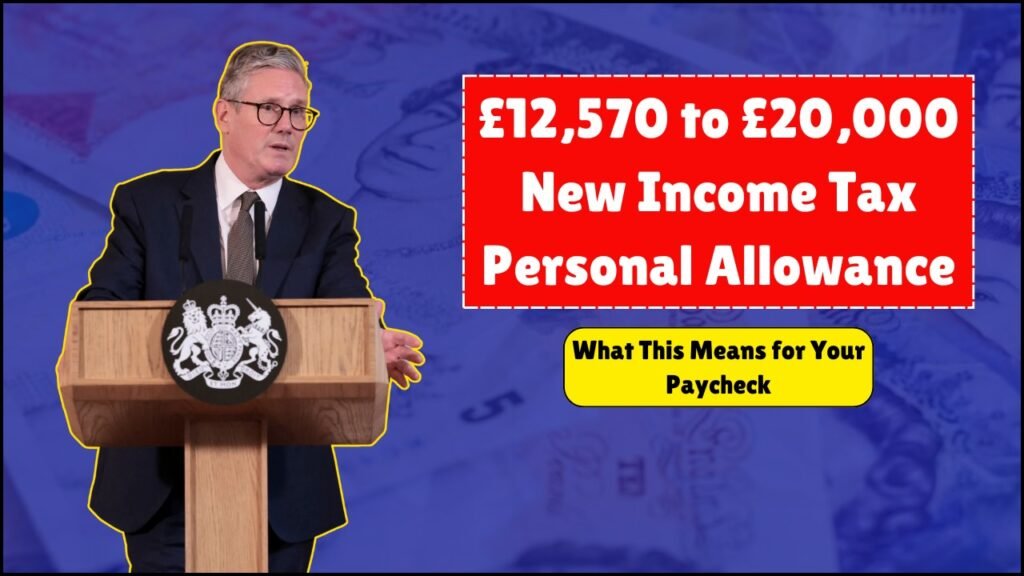
A strong public movement in the UK is calling for a major adjustment to the personal income tax allowance. Campaigners want the current threshold of £12,570 to be raised to £20,000, a change that would leave millions with more disposable income. The initiative, spearheaded by campaigner Alan David Frost, has gained rapid traction, especially among workers and pensioners.
By early September 2025, the petition had surpassed 281,000 signatures, well beyond the 100,000 mark that requires Parliament to consider the matter for debate. While the campaign reflects overwhelming public support, government ministers have already expressed hesitancy, citing fiscal challenges.
Table of Contents
Overview
| Factor | Current Threshold (£12,570) | Proposed Threshold (£20,000) |
|---|---|---|
| Tax-free income | £12,570 | £20,000 |
| Effect on pensioners | Many taxed on pensions | Most pensions tax-free |
| Relief for middle earners | Limited | Up to £1,486 yearly |
| Treasury impact | Neutral | £40–50bn annual loss |
| Inflation effect | Stable | Possible price increases |
| Public pressure | Moderate | High (281k+ signatures) |
What the Personal Allowance Means
The Personal Allowance is the amount of money an individual can earn before paying income tax. This figure has been frozen at £12,570 since 2021, despite rising living costs and inflation. Critics argue that the freeze has dragged more workers into higher tax brackets while reducing pensioners’ effective income.
Supporters of the proposed £20,000 threshold believe it would:
- Provide instant relief for lower earners.
- Protect pensioners from having their State Pension taxed.
- Stimulate household spending and strengthen the economy.
- Allow families to rely less on state benefits.
On the other hand, opponents highlight that this change would create a shortfall of £40–50 billion in tax revenue, sparking concerns about how essential services like healthcare, education, and social care would continue to be funded.
Eligibility Criteria
If Parliament approves the increase, three main groups would benefit:
- Low-income workers – Many would be lifted out of income tax entirely.
- Retirees – The majority of pensioners would retain their pensions untaxed.
- Middle earners – Households could save nearly £1,500 a year, offering significant financial relief.
Government Position – September 2025 Update
Despite the growing public backing, the UK government has formally rejected the proposal for now. Ministers argue that such a significant jump would:
- Severely reduce tax revenues needed for public services.
- Disrupt long-term financial planning.
- Risk fueling inflation during an already fragile economic recovery.
Officials reassured citizens that tax thresholds are reviewed regularly and any potential changes will likely be considered during major fiscal announcements like the Autumn Statement or the Budget.
What Happens After the Petition
The UK petition system ensures citizens’ concerns are formally acknowledged:
- At 10,000 signatures, the government issues a response.
- At 100,000 signatures – Parliament must consider holding a debate.
With over 281,000 signatures, MPs are now under pressure to discuss the issue. However, whether debate leads to real policy change remains highly uncertain.
Current Tax Allowance Rules in the UK
For most taxpayers, the Personal Allowance is £12,570, but there are exceptions:
- High earners above £100,000 see their allowance reduced by £1 for every £2 earned.
- At £125,140 or more, no personal allowance applies.
- Married couples or civil partners may transfer part of their allowance under the Marriage Allowance scheme.
- Individuals born before April 6, 1935, may qualify for the Married Couple’s Allowance for added relief.
Any shift to £20,000 would dramatically alter these calculations and provide noticeable relief to millions.
Barriers to Implementation
Despite strong public demand, serious hurdles remain before such a proposal could be adopted:
- Revenue loss – The Treasury would need to replace £40–50 billion annually.
- Potential rise in other taxes – VAT, National Insurance, or other levies may be adjusted to offset losses.
- Inflationary pressure – Extra disposable income could push consumer prices higher.
Ultimately, policymakers must weigh the immediate relief for households against the long-term sustainability of public finances.
FAQs
Q1: What is the current UK Personal Allowance?
A: It is set at £12,570, meaning income below this amount is tax-free.
Q2: Has the £20,000 threshold been approved?
A: No, the government has declined the proposal due to fiscal concerns.
Q3: Who benefits the most from a higher allowance?
A: Low earners, pensioners, and middle-income households would gain the most.


